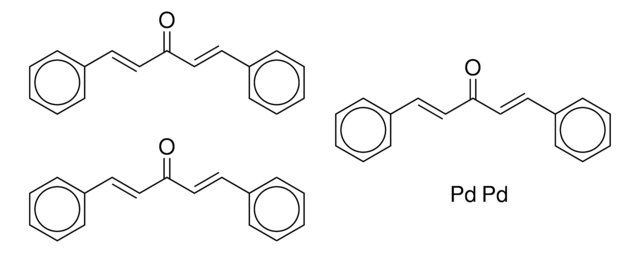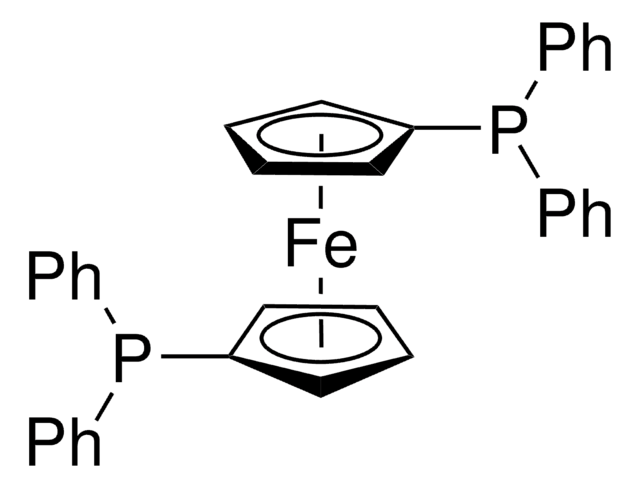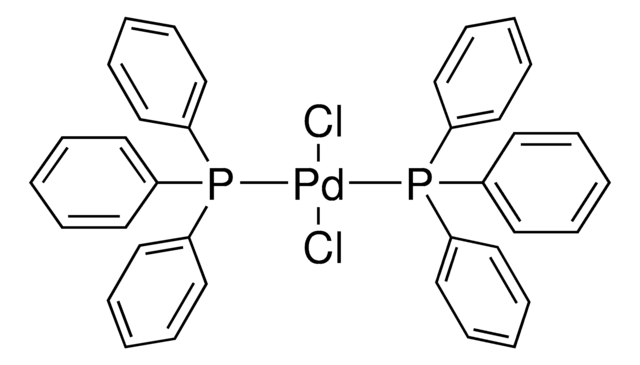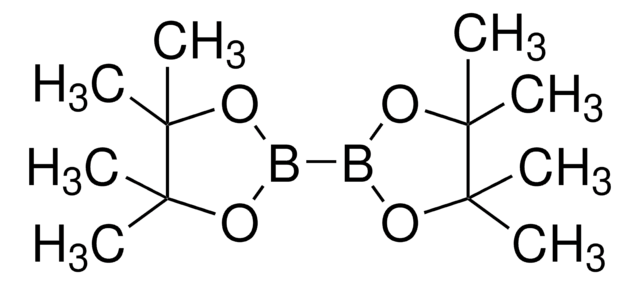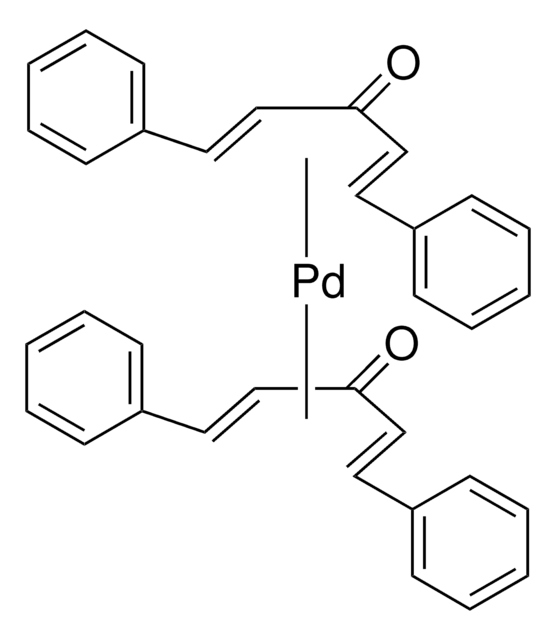919780
[1,1′-Bis(diphenylphosphino)ferrocene]dichloropalladium(II) ChemBeads
Sinônimo(s):
Pd(dppf)Cl2
About This Item
Produtos recomendados
forma
solid
Nível de qualidade
composição
~ 4 wt.% loading of catalyst
adequação da reação
reagent type: catalyst
reaction type: Cross Couplings
InChI
1S/2C17H14P.2ClH.Fe.Pd/c2*1-3-9-15(10-4-1)18(17-13-7-8-14-17)16-11-5-2-6-12-16;;;;/h2*1-14H;2*1H;;/q2*-1;;;2*+2/p-2
chave InChI
NXQGGXCHGDYOHB-UHFFFAOYSA-L
Aplicação
Pd(dppf)Cl2 may be used as an effective palladium catalyst in the following reactions:
- Cross-coupling of sec-alkyl and n-alkyl Grignard reagents with high yield and selectivity.
- Suzuki coupling of aryl boronic esters with [11C]methyl iodide to form functionalized [11C]toluene derivatives.
- Kumada cross-coupling of 1,3,5-tribromobenzene with Grignard reagents to form star-shaped oligothiophenes.
ChemBeads are chemical coated glass beads. ChemBeads offer improved flowability and chemical uniformity perfect for automated solid dispensing and high-throughput experimentation. The method of creating ChemBeads uses no other chemicals or surfactants allowing the user to accurately dispense sub-milligram amounts of chemical.
Learn more about ChemBeads products
For larger scale uses, product also available in powdered form (697230) & (931217)
Outras notas
Versatile Methods to Dispense Sub-Milligram Quantities of Solids using Chemical Coated Beads for High-Throughput Experimentation
ChemBead Enabled High-Throughput Cross-Electrophile Coupling Reveals a New Complementary Ligand
produto relacionado
Palavra indicadora
Danger
Frases de perigo
Declarações de precaução
Classificações de perigo
Carc. 1B Inhalation
Código de classe de armazenamento
6.1D - Non-combustible acute toxic Cat.3 / toxic hazardous materials or hazardous materials causing chronic effects
Classe de risco de água (WGK)
WGK 3
Ponto de fulgor (°F)
Not applicable
Ponto de fulgor (°C)
Not applicable
Escolha uma das versões mais recentes:
Certificados de análise (COA)
Lamentamos, não temos COA para este produto disponíveis online no momento.
Se precisar de ajuda, entre em contato Atendimento ao cliente
Já possui este produto?
Encontre a documentação dos produtos que você adquiriu recentemente na biblioteca de documentos.
Nossa equipe de cientistas tem experiência em todas as áreas de pesquisa, incluindo Life Sciences, ciência de materiais, síntese química, cromatografia, química analítica e muitas outras.
Entre em contato com a assistência técnica![[1,1′-Bis(diphenylphosphino)ferrocene]dichloropalladium(II)](/deepweb/assets/sigmaaldrich/product/structures/130/734/8846aa26-1858-458a-998d-8c306c13bf0f/640/8846aa26-1858-458a-998d-8c306c13bf0f.png)
![[1,1′-Bis(diphenylphosphino)ferrocene]dichloropalladium(II), complex with dichloromethane](/deepweb/assets/sigmaaldrich/product/structures/825/986/4317978b-1256-4c82-ab74-6a6a3ef948b1/640/4317978b-1256-4c82-ab74-6a6a3ef948b1.png)
